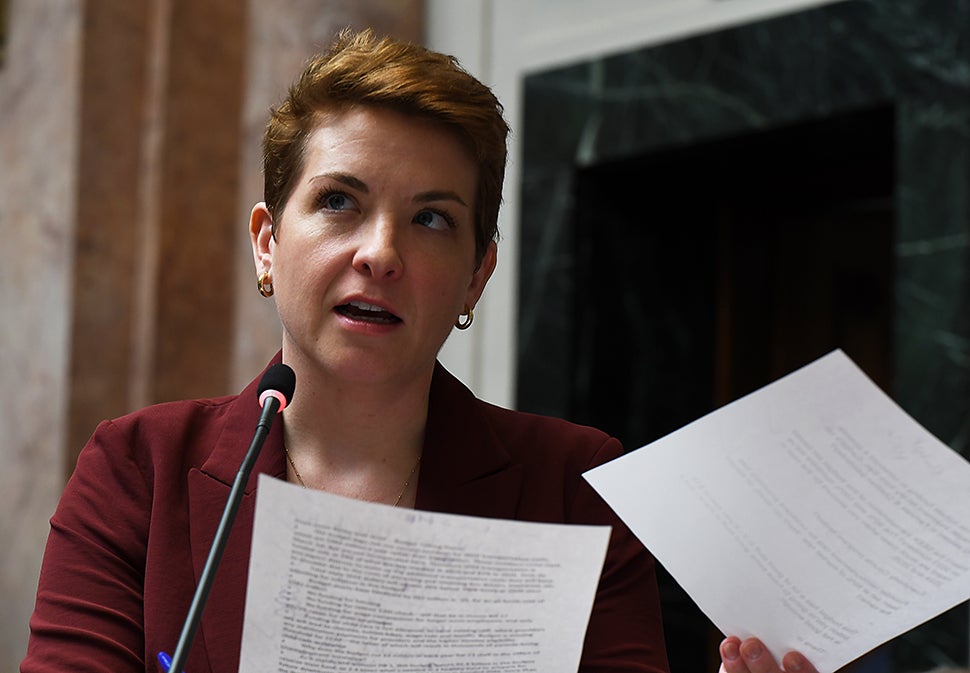With time ticking, legislature rushes to pass dozens of bills. What to know.
Published 11:50 pm Thursday, March 28, 2024

- FRANKFORT, March 28 – Rep. Josie Raymond, D-Louisville, asks a question about the free conference committee report to House Bill 6, the biennial state budget, during Thursday’s House proceedings. (LRC Public Information)
FRANKFORT — As the clock struck midnight Thursday, Kentucky lawmakers scurried away from the State Capitol for a ten-day break. Hopefully, none lost any glass slippers.
The ten-day veto period began Friday, and runs until Tuesday, April 9. During this time, Gov. Andy Beshear will decide what to do with the bills the legislature has passed—sign them into law, veto them or do nothing, which would allow them to become law without his signature.
Vetoed bills will return to the legislature on its final two days on April 12 and 15. The legislature can then override Beshear’s vetoes with a simple majority of both chambers.
There were a few surprises. Chief among them was the “death” of Senate Bill 6, the session’s anti-DEI bill. House Speaker David Osborne told reporters that after the Senate added language from a separate anti-DEI bill, the two chambers could not find a compromise.
Here’s a few of the dozens of bills the legislature passed before gaveling out Thursday night.
House Bill 1: One-time spending budget
Both chambers approved a compromise one-time spending budget Thursday. It appropriates $2.7 billion, less than the original Senate version but more than the House version.
It funds hundreds of specific projects, including $50 million for a Western Kentucky Law Enforcement Training Academy in Madisonville and $10 million to the Rural Housing Trust Fund.
The final version excludes the Senate’s “13th check” for state employees and state police retirees.
It also leaves out funding for two new female juvenile detention centers. However, it does include funding to retrofit current facilities for that purpose.
Senate Bill 2: Guardians in schools
Senate Bill 2 is a “stopgap” measure for school districts that have been unable to meet the 2019 School Safety and Resiliency Act’s requirement for one school resource officer per school campus, said sponsor Sen. Max Wise, R-Campbellsville.
It would allow so-called guardians – discharged veterans, retired Kentucky state troopers, retired special and sworn law enforcement officers and former federal law enforcement officers – to support current SROs or serve in a temporary safety role until districts can find SROs.
Under SB2, guardians would be able to carry weapons, but would not have arrest power like SROs. Otherwise, local boards would be free to determine whether guardians are in volunteer or paid roles and what they can and cannot do, Wise said.
An updated version of the bill requires guardians to complete 160 hours of curriculum, including active shooter response, enhanced handgun performance and patrol rifle training.
The bill would require schools to create trauma-informed teams made up of school mental health professionals and SROs to identify and help students whose learning, behavior or relationships have been impacted by trauma.
Opposition to the bill was limited to three minutes of debate Thursday evening as the House approached an hour until its midnight deadline.
Rep. Lisa Willner, D-Louisville, used that time to comment that only Florida has incorporated a guardian program, and several key stakeholders were missing from conversation surrounding this bill—law enforcement, Center for School Safety Executive Director John Akers and State Security Marshal Ben Wilcox.
“Never ever has a person with a gun stopped a school shooting,” Willner said. “What stops school shootings are positive, healthy relationships in schools where people report when there is suspicious activity.”
Neither Louisville Democratic Rep. Josie Raymond nor any of her colleagues were permitted to explain their no votes. She told reporters it was a “bullshit process” to save one of the most controversial bills for when time was most tight.
“I should not be penalized for their poor time management,” Raymond said. “This bill is inviting strangers with guns into our children’s schools… As a parent of elementary school students, that really frightens me. What kind of yahoos are attracted to this volunteer position where you get to walk around and be a big man in school.”
House Bill 622: U.S. Senate vacancies
The House approved a bill that would change the process for filling vacancies for Kentucky’s U.S. Senators.
A few years ago, vacancies would have been filled by governor appointment until the next statewide election. However, in 2021, the majority Republican legislature amended the process to give governors less power.
The 2021 bill stated that governor could appoint a replacement from a list of three names submitted by the political party of the outgoing U.S. Senator.
This session, Rep. Steven Rudy, R-Paducah, decided to take even more governor power away. House Bill 622 would require the governor to call for a special election to fill a vacancy.
Rudy has stated that it has nothing to do with U.S. Senator Mitch McConnell, who has faced public health issues recently.
House Bill 11: Vaping
Rep. Rebecca Raymer, R-Morgantown, said she filed HB11 because she has a son in middle school.
The bill would regulate vaping in Kentucky. It would ban retailers from selling vapor products to people under 21 or face a fine.
It would also require creation of a list of retailers that sell vapor products for enforcement purposes. Retailers would only be allowed to sell vapor products authorized by the U.S. Food and Drug Administration or possessing a safe harbor certification.
House Bill 752: Disaster recovery
The Senate and House passed a final version of HB752 Thursday.
It appropriates money from the East Kentucky State Aid Funding for Emergencies (EKSAFE) and the West Kentucky State Aid Funding for Emergencies (WKSAFE) for various flood and tornado recovery projects.
If signed into law, the School Facilities Construction Commission will get $11 million in fiscal year 2025 to rehabilitate the Breathitt Area Technology Center, which was destroyed during the 2022 Eastern Kentucky flooding.
The City of Mayfield will receive $25.5 million to rebuild their fire station, police station and city hall, which were all destroyed by 2021 tornadoes.
Mayfield Mayor Kathy O’Nan has previously said one of their fire stations is located in the back of an elementary school that also serves as the city’s health department.
FEMA’s temporary fire station is not a long term solution, either, O’Nan said.
The police department was operating out of a suboptimal, subleased office building.
Under the bill, the Department for Local Government would get $6.1 million for the Graves County administrative building. All unused funds would expire on June 30, 2026.
Senate Bill 349: Creating new energy commission
Under SB349, a new group—the Energy Planning and Inventory Commission— would be responsible for creating a comprehensive energy strategy for Kentucky, which supporters say the current Public Service Commission has failed to do.
Electric utilities would have to go to EPIC first before submitting an application for retirement of a fossil fuel-fired plant with the PSC, adding an extra step of oversight.
Utilities would have to submit a report to EPIC, explaining the impact of a plant retirement on:
- the reliability of the power supply;
- the ability of Kentucky to meet future demand growth and respond to extreme weather events without the plant;
- local and state economies and revenue; and
- the ability to support current or future economic development.
The report would also include what alternatives should be considered before retirement. Under the bill, a plant could not be retired until a new form of electric generation met or exceeded the capacity of the retiring plant, unless a utility can prove that “such capacity value and net capability is not necessary to provide reliable service.”
Opponents of the bill argue that the 18-member EPIC board is stacked with special interest groups, like representatives from coal, oil and gas producers and transporters.
Coal billionaire Joe Craft, whose wife Kelly Craft ran for governor, has reportedly been involved in gathering support for the bill. The House voted 57-37 to pass the bill Thursday.
In April, the General Assembly will return for a final two days to override vetoes and pass any final legislation.





